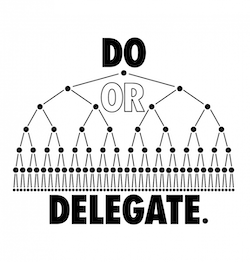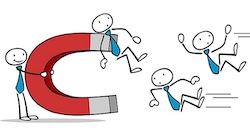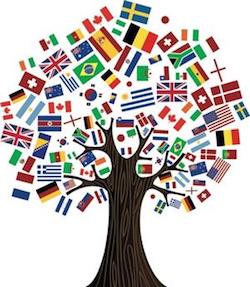
Why feedback matters and how to receive it.
During an online training last week I heard Young Professionals tell me over and over how difficult it is for them to give and to receive feedback. Research shows that not getting feedback is very often why people leave the job. They say the following:

Leaders, align your team through inspriring questions!
As a coach, I believe, it is through questions that we develop. Especially leaders, when you find yourselves in the midst of crisis and uncertainty, you should ask powerful and inspiring questions. Eventhough you might think that people look to you for answers!
Asking questions well can put you on the path to solving intractable problems and will also help you connect with your team and, counterintuitively, to earn their trust. Those questions should be big in scope: What new opportunities have emerged that we don’t want to miss? How might we use new technologies to change our business model? And you should involve others in answering those questions —employees, stakeholders, and even customers. Doing so can not only help you generate better answers, it can also help you to change your organization’s cult. The kind of questions leaders need to ask are those that invite people to come together to explore major new opportunities that your organization hasn’t identified yet. Rather than on the existing activities of the organization. Here are some examples:

Coachable or non-coachable?
Executive coaching can help you develop your fullest potential, make you aware that there should be an alignment between the company you work for, your personal values and the purpose why you work. Here are seven core characteristics that differentiate leaders who evolve through coaching from those who don’t.
• Openness to experimentation; taking risks.
• Ability to look beyond the rational; like looking at fear, anger, irritations and pride.
• Willingness to take responsibility; you can shape your future.
• Capacity for forgiveness; stop defending that you were right.
• Self-discipline; let go of ways of thinking that made you successful in the past.
• Ability to ask for support; share goals and listen out of curiosity and learn from others through asking feedback.
• Invest in time and effort.

Over-performers, know what makes them tick
My client graduated with the highest honors, and moved up the corporate ladder quickly, and accepted, or should I say was deceived, many large responsibilities through different assignments. Within a couple of years, she was, at the age of 26, advising the board. She was, in everyone's estimation, an "A player"—one of the gifted and productive employees. She consistently overperformed, and her boss said she did great work. She though worked harder and harder. But although she received many compliments, she missed a non-judgemental mentor to learn from. She felt under-appreciated and stressed almost leading to a burn-out. She was already looking for another job. Through coaching, she got an insight that it is not the job but that she is striving to satisfy an inner need for recognition based on low self-esteem. She was working extrinsically instead of intrinsically driven. Certainly, managers aren't therapists or executive coaches, and they don't have to be. But it will help managers if you try to understand what makes these employers tick. If we do not carefully manage the often-unconscious needs of these over-performers for appreciation, they will bum out in a way that is damaging to themselves and unproductive for the company.

How Different Personality Types Cope with an Always-On Culture
Looking at the four strategies in light of MBTI personality type can help you identify how to use them most effectively to reduce the negative effects of being always on. Especially useful since we are working from home.MBTI test
1. Create time and space to switch off.
If you have extraversion preferences, recharge by doing something active, perhaps with others (even if that happens virtually while you’re social distancing). If working from home, make sure to take breaks. Go for a walk or a run if you can, or do something new and different. Some extraverts find it helpful to leave their devices in another room when they’re de-stressing. Keep in contact with others, and use video, not just voice.

Pandemic uncertainty?Take mindful pauses!
I am, like most of you, working from home. I "tele-coach". It works well. I should be relaxed but I feel restless/anxious. I find that the most difficult part of this pandemic is the uncertainty we are all facing. Uncertainty about our health. Uncertainty about how long we have to stay home. Uncertainty about our future plans. Uncertainty about our jobs. Uncertainty about the economy. What to do?
First, it’s important to understand that fear is a basic human mechanism. It helps us survive. But fear mixed with uncertainty can lead to something quite bad for our mental health: anxiety. And when anxiety is spread by social contagion it can lead to panic.
Taking a mindful pause works by keeping the thinking parts of our brains “online” so we can help rather than hinder. Taking a moment to pause in stressful situations, whether that means you take three deep breaths or simply pay attention to the feeling in not-anxious parts of your body (like your feet or your hands), helps ground you in calmer emotions.
Breath and ask yourself: What do I need to do this hour?

Do not use the word INNOVATION when it comes to engaging employees
Innovation is a management buzzword . In fact, it has been the buzzword for so long, you could say we’ve developed a cult around it. There is only one problem: We managers might love innovation. But most of our employees hate it. The word “innovation” might speak to your external stakeholders, but when it comes to engaging your employees, it’s time to stop using the word. Research shows why:

Delegate successfully
In my own work as a leadership coach, I have recognized when leaders delegate successfully. It’s important for delegators to set aside their attachment to how things have been done in the past but reward novel approaches that work by doing the following:

Positive performance but Position eliminated
While it seems counterintuitive, strong performance in your role doesn’t equal job security. I’ve seen plenty of firsthand evidence of this through coaching a wide range of executives in diverse industries. Research supports this reality as well. In a Zenger and Folkman study, 77% of employees whose positions were eliminated had received positive performance reviews in the year prior to their dismissal.
Wednesday 15 January 2020 hits: 20972
Retrospective 2019
It was an educational and inspiring year for me. Thanks to everyone with whom I could share this.
= The average age of my clients decreased.
= The demand for work-life balance increased.
= The demand for team leadership versus management increased.
Themes:
= Equivalence.
= Less personalizing work
= Dealing with resistances without involving yourself and dealing with authority if you are sensitive to it.
We have regularly drawn the following conclusion:

Humans over robots?
50 % of the jobs cannot be automated because of emotion and context.
First, emotion. Emotion plays an important role in human communication. It is critically involved in virtually all forms of nonverbal communication and in empathy. But more than that, it is also plays a role in helping us to prioritize what we do, for example helping us decide what needs to be attended to right now as opposed to later in the evening. Emotion is not only complex and nuanced, it also interacts with many of our decision processes and is difficult to build into an automated system.
Second, context. Humans can easily take context into account when making decisions or having interactions with others.

Feeling guilty towards your parents?
I remember two stories from young male clients about feeling guilty towards their parents (father) because of the choices they want to make in their adult life. I thought ...very interesting in this time and age. So I asked them:
“How come you cannot talk about this subject with your parents? “
They said: “Fear for disappointing them and quilt for not being the perfect son.”
When I asked more questions, I heard that most of their thoughts and fears were not real but felt real according to their assumptions. And what they had experienced as a child.
But now we are adults...Unfear yourself.... Let’s learn to talk more as equals about our mutual expectations. And check our assumptions by being explicit in our questioning. "maybe you do not like what I want to share with you but at this time in my life I have to make this choice, I hope you understand.

Why is it so hard to stop worrying?
When we are more than even preoccupied with “what ifs” and worst-case scenarios, worry becomes a problem.

Look in the mirror and love again the stranger who was your self
LOVE AFTER LOVE
The time will come when,
with elation and joy, you will greet yourself
in your own mirror and each will smile and welcome the other and say:

Counteroffer, stay or go?
You finally decide to start looking for a new job. You go through a lengthy search process, you’re presented with an enticing career opportunity, and get an offer you’re fully prepared to accept. But when you tell your current employer you’re planning to leave, they surprise you with a counteroffer. Should you stay or should you go? Research shows:
Thursday 07 February 2019 hits: 24567
Is it true what we think?
Assumption is probably a word that I use in every coaching session. Byron Katie says: “As long as you think that the cause of our problem is “out there”—as long as we think that anyone or anything is responsible for our suffering—the situation is hopeless. It means that we are forever in the role of victim, that we are suffering because of our thoughts, assumptions.”
Friday 11 January 2019 hits: 24651
Candid in 2019
Dear Clients, Thank you for the nice and pleasant cooperation in the past year. I am inspired by you and learned a lot again: From new perspectives to beautiful dreams for the future. It makes me curious what 2019 will bring us. I wish us a candid year.
Thursday 10 January 2019 hits: 24754
Creative boss? But how do we get things done?
Visionary bosses can be exciting, fun, and innovative. But the thought that you are the only one who gets anything done and contributes value, accurse often. Here are some helpful strategies for managing up when your boss gets distracted by too many creative ideas.
Wednesday 21 November 2018 hits: 22474
Feedback signals that the boss is in charge, start with listening first!
Almost every day I talk about Leadership and learning to listen. We want to talk and explain everything. Also when it comes to giving feedback. But giving feedback starts with listening.
Friday 25 May 2018 hits: 25524
Multicultural leadership; embrace the differences
Many of my expat clients talk about multicultural leadership. I learned that it involves deep immersion within different cultures to understand their values and specific context. Only through knowing other cultures deeply can we effectively connect the dots between them and highlight meaningful differences between cultures that impact business strategy and collaboration. Address the following 4 issues to understand each other better.
Tuesday 27 March 2018 hits: 26556Page 2 of 3



